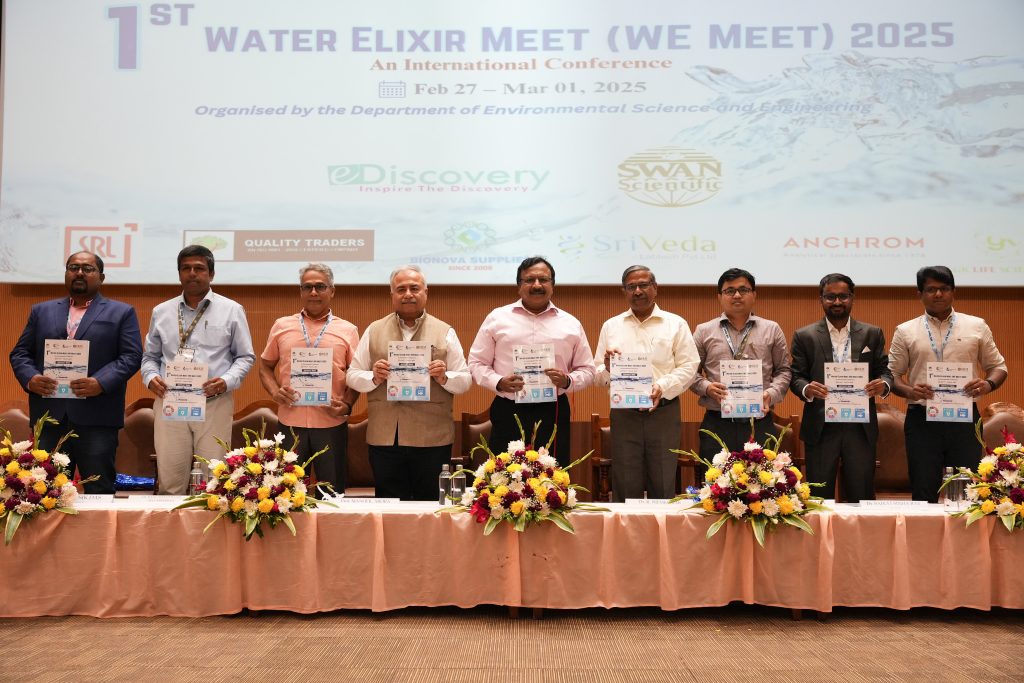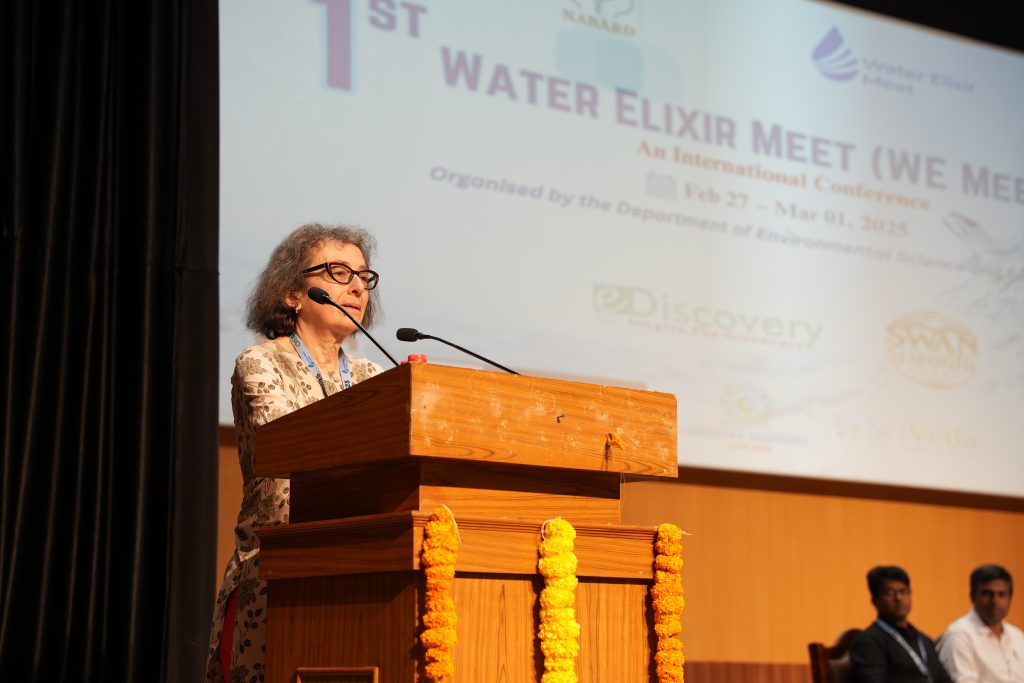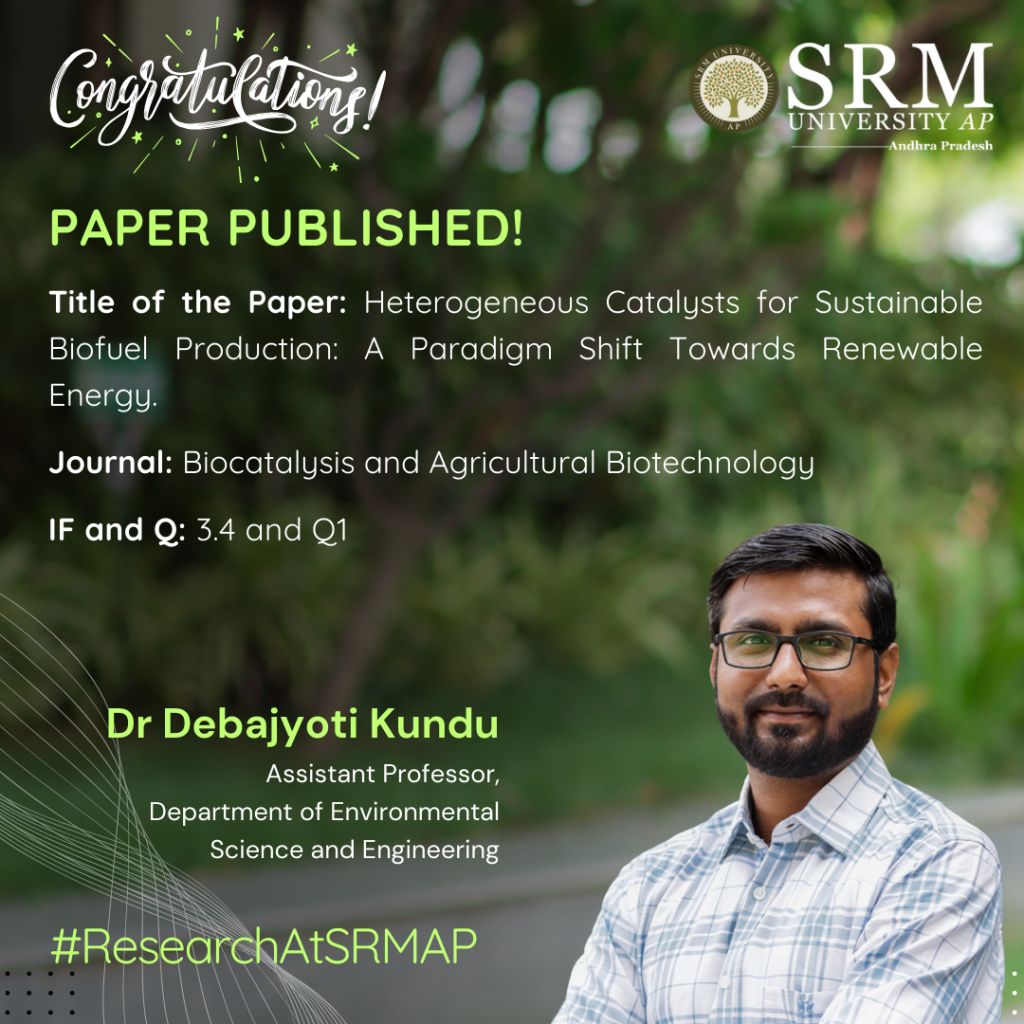Current Happenings ENVS News
- “A New Dawn of Water Sustainability”: 1st Water Elixir Meet 2025 March 3, 2025

The Department of Environmental Science and Engineering hosted the 1st Water Elixir Meet (WE Meet 2025), a three-day international conference bringing together global minds to address one of the world’s most pressing challenges: water sustainability and security on Feb 27 – Mar 01, 2025. The conference was inaugurated by Prof. Rajasekhar Balasubramanian, Provost’s Chair Professor Group Head (Hydraulics, Hydrology and Climate Resilience), Department of Civil and Environmental Engineering, National University of Singapore.
“The available water quantity is decreasing, and the water quality is declining. There is a dire need to look into these parameters holistically and not separately. The We Meet 2025 is an ideal platform where scientists, researchers, policymakers, and industry leaders converge to address and manage global water resources efficiently and strategically,” stated Prof. Rajasekhar in his inaugural address.
WE Meet 2025 brought together more than 150 research abstracts and an esteemed lineup of global speakers, sharing groundbreaking insights into water resources, hydrogeology, and environmental sustainability. Prof. Kwang Ho-Choo from Kyunpook National University, South Korea, Prof. Shiao-Shing Chen from National Taipei University of Technology, Taiwan, Prof. Fulvia Chiampo from Politecnico di Torino, Italy, were some of the notable international speakers who delivered keynote sessions at the conference.
Prof. Manoj K Arora, Vice Chancellor, remarked beyond academic and research possibilities, WE Meet 2025 aimed at fostering global partnerships, innovative solutions, and cultural exchange. He stated, “WE Meet 2025 is a timely conference organised to address critical issues such as water resource management and water conservation.” Dr Rangabhashiyam Selvasembian, Head of the Department of Environmental Science and Engineering, also opined that this groundbreaking gathering fosters dialogue for impact. He said that the conference is a testament to the power of creative action in securing a sustainable tomorrow.

By showcasing cutting-edge technologies and driving policy advancements, WE Meet 2025 at SRM University-AP serves as a catalyst for real-world change. Exemplary research works such as the Best Oral Presentation and the Best Poster Presentation, were awarded top prizes at the valedictory ceremony. The conference also saw the participation of Registrar Dr R Premkunar, Dean – School of Engineering and Sciences, Prof. C V Tomy, Dean–Research, Prof. Ranjit Thapa, faculty, scholars and students of the varsity.
As the world grapples with increasing water challenges, this landmark international conference paves the way for a transformative journey to secure the future of water.
Continue reading → - Dr Debajyoti’s Research on Improving Biofuel Production February 19, 2025
 In the quest for sustainable energy solutions, Dr Debajyoti Kundu, from the Department of Environmental Science and Engineering, examines the potential of biofuels through his research paper – “Heterogeneous Catalysts for Sustainable Biofuel Production: A Paradigm Shift Towards Renewable Energy.” The paper highlights the importance of heterogeneous catalysts for improving biofuel production efficiency. The research also suggests future research to support sustainable energy practices.
In the quest for sustainable energy solutions, Dr Debajyoti Kundu, from the Department of Environmental Science and Engineering, examines the potential of biofuels through his research paper – “Heterogeneous Catalysts for Sustainable Biofuel Production: A Paradigm Shift Towards Renewable Energy.” The paper highlights the importance of heterogeneous catalysts for improving biofuel production efficiency. The research also suggests future research to support sustainable energy practices.Brief Abstract:
This study focuses on the use of heterogeneous catalysts for sustainable biofuel production. With the growing concerns around fossil fuel depletion and environmental pollution, biofuels derived from biomass are emerging as promising alternatives. The article explores the significant role of heterogeneous catalysts in enhancing biofuel production by improving conversion efficiency, recyclability, and environmental impact. By analyzing various biomass sources, structural compositions, and the application of catalysts in bioethanol, biobutanol, biodiesel, biogas, and biohydrogen production, the study highlights recent advancements and provides recommendations for future research to drive sustainable energy solutions.
Explanation in layperson’s terms:
This research looks at how we can produce more environmentally friendly fuels from natural materials like plants and waste. Traditional fuels like oil and coal are harmful to the environment, so we are turning to biofuels made from biomass (such as plants) as a cleaner alternative. A key part of making biofuels efficiently is using special catalysts—materials that help speed up chemical reactions. The study examines how different catalysts are used to convert biomass into biofuels such as bioethanol, biodiesel, and biogas. The goal is to improve the processes, making biofuels more sustainable and accessible for the future.
Practical Implementation and Social Implications:
This research has significant implications for advancing renewable energy. The use of heterogeneous catalysts can make biofuel production more efficient and environmentally friendly, reducing reliance on fossil fuels and mitigating climate change. By optimizing biofuel production processes, we can develop cleaner energy solutions that are sustainable, carbon-neutral, and beneficial for the environment. This study also supports the ongoing shift towards renewable energy, ensuring that biofuels can contribute to reducing global energy crises and health risks associated with fossil fuel use.
Future Research Plans
Our future research will focus on the development and optimization of biocatalysts for the bioconversion of biomass into biofuels. We aim to enhance the efficiency and sustainability of biocatalytic processes, exploring new catalysts and reaction conditions that can improve the conversion of various biomass feedstocks into valuable biofuels. This research will contribute to advancing biofuel production technologies, with an emphasis on reducing environmental impact and improving the scalability of bioconversion processes for renewable energy solutions
Continue reading →







